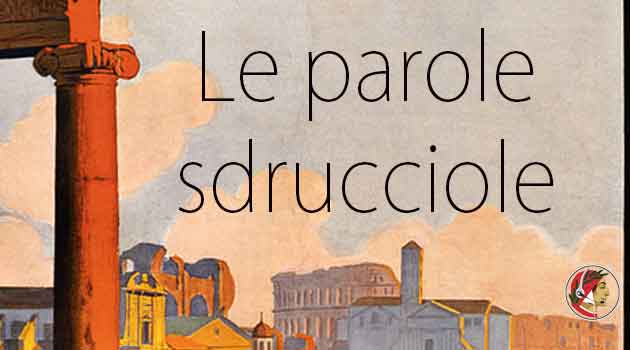The stress on Italian words can be on different syllables. Let’s learn different scenarios and rules.
-
Accento piano. (plain stress)
The vast majority of Italian words has the stress on the penultimate syllable, hence the musical cadence of our language. If you have doubts on a word and need to guess, that’s the easiest way to go. – e.g – Lavoro, Matita, Spaghetti, Vacanza…
-
Accento sdrucciolo. (third to last)
The stress is on the terzultima sillaba, third to last, and it’s not uncommon. There are rules helping us to identify this family of words. Please see below. – e.g. – Nuvola, Davide, Napoli, Gomito …
-
Accento tronco. (truncated stress)
The stress is on the last syllable. In this case, we have to write it. Some words are: città, perché, vanità, caffè…
In some rare cases, the stress can fall on the fourth or fifth to last syllable.
Le parole sdrucciole
The most confusing and consistent group of words after the parole piane is the parole sdrucciole, with the stress on the third to last syllable. We can identify some predictable patterns typical of the sdrucciole words.
-
Nouns and adjectives ending in -abile, -aceo, -evole, -ibile, -ilico, -ognolo, -oide, -esimo:
e.g. – mangiabile, violaceo, confortevole, impossibile, basilico, verdognolo, celluloide, undicesimo.
-
Words ending in -agine, -aggine, -edine, -igine, -iggine, -udine, -uggine:
e.g. voragine, stupidaggine, salsedine, origine, lentiggine, solitudine, ruggine.
-
Words or Greek origin ending in -cefalo, -crate, -gamo, -geno, -mane, -stato, -ttero:
e.g. macrocefalo, burocrate, poligamo, ansiogeno, megalomane, termostato, elicottero.
-
Words of Latin origin ending in -fero, -fugo,-pede, -voro:
e.g. calorifero, ignifugo, palmipede, carnivoro.
Experience will help you to understand and remember when the stress is not piano. If you have questions, get in touch with comments or email. Thanks for reading.








Geweldig geschreven
Hi Riccardo,
Two questions for you, first, and this is just from my time in Venezuela, where the word “esdrújula” (Spanish for sdrucciolo) bears the accent on the antepenultimate syllable – is “sdrucciolo” accented on the penultimate or antepenultimate syllable? Second, and this is the quest that landed me on your helpful site… In your experience, is “Medici” (as in Caterina de Medici) pronounced as piano or tronco?
Accento tronco = ultima sillaba ☞ Caffè
Accento piano = penultima sillaba ☞ Milano
Accento sdrucciolo = terzultima sillaba ☞ Napoli
Si dice Medici, accento sdrucciolo. Ciao.
L’articolo mi piace.
Sono capitato qui perché cercavo di capire come mai c’è differenza di accento fra isòbara e isocòra. Entrambe le parole sono composte da “iso” + qualcosa che deriva dal greco e non vedo (nella mia ignoranza) ragioni per cui l’accento dovrebbe essere diverso: stesso numero di lettere dopo “iso”, vocali e consonanti disposte nello stesso ordine…
C’è qualche regola o è semplicemente l’uso invalso che determina l’accento?
Grazie se potrai rispondere.
E’ un’ottima domanda alla quale non so dare una risposta definitiva. Credo che, come dici tu, l’uso invalso ne abbia determinato la struttura. Questo capita nella nomenclatura scientifica, non solo in italiano. Si veda il caso di aluminum e aluminium in inglese.
Pagina ben fatta e molto chiara.
Grazie.